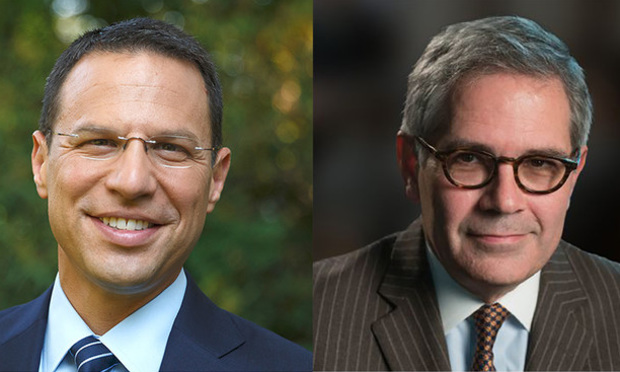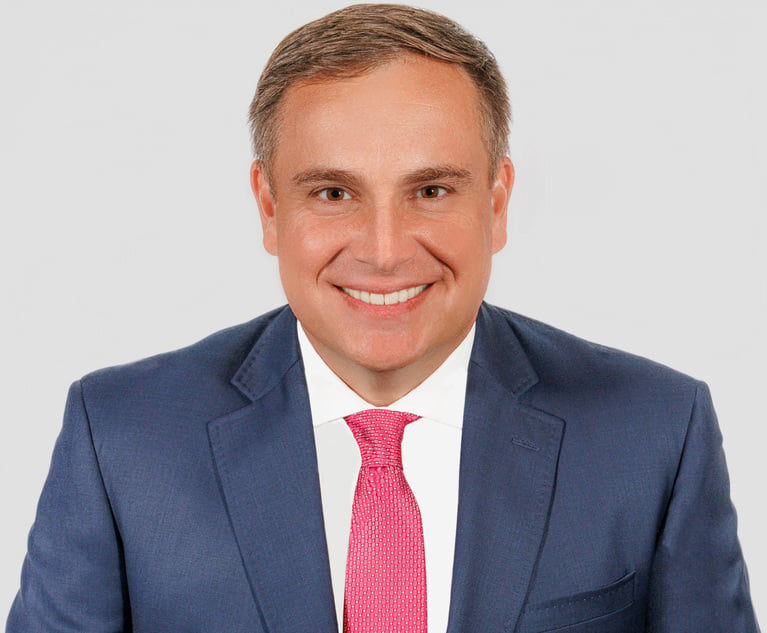Krasner, New Task Force at Odds on Key Issue in Opioid Fight
While Philadelphia DA Larry Krasner supports safe injection sites, state Attorney General Josh Shapiro shuns the idea. The sticking point on safe injection is an early bump in the road for the newly-formed task force.
February 21, 2018 at 02:38 PM
5 minute read

On Feb. 15, state and federal prosecutors held a press conference to unveil a new task force billed as a united front against the opioid epidemic with participation from all of the district attorney offices in southeastern Pennsylvania. But Philadelphia District Attorney Larry Krasner wasn't there, nor was anyone else from his office.
Instead, Krasner was holding his own press conference at the same time just blocks away to announce that his office had filed a consumer protection lawsuit against 10 different pharmaceutical companies for manufacturing opioids.
And during the course of those two press conferences, Krasner and his fellow top prosecutors reiterated their opposing views on a key policy issue: whether safe injection sites for heroin users are beneficial in fighting the opioid epidemic.
Krasner, Attorney General Josh Shapiro and Philadelphia Acting U.S. Attorney Louis Lappen are members of the newly minted Eastern District of Pennsylvania Law Enforcement Opioid Task Force, a cross-agency group created to coordinate a regional law enforcement response to the opioid crisis. In addition to Shapiro's, Lappen's and Krasner's offices, the task force is made up of district attorney offices from Berks, Bucks, Chester, Delaware, Lancaster, Lehigh, Montgomery and Northampton counties.
But while Krasner supports safe injection sites, Shapiro and Lappen shun the idea. The sticking point on safe injection is an early bump in the road for the newly-formed task force.
At the Feb. 15 press conference announcing the task force, Lappen referred to the concept of safe injection sites as “oxymoronic,” likening it to a “safe suicide site.”
Meanwhile, during the question-and-answer portion of his own press conference that day, Krasner repeated his support for the sites, which he first spoke about while still a district attorney candidate.
In addition, when reached for comment, a spokesman for Shapiro's office pointed to comments Shapiro made last month.
“There is no safe way to inject heroin, fentanyl and carfentanyl,” Shapiro said in a statement in late January. ”These are dangerous drugs with devastating consequences for the person struggling with addiction and the communities where these sites are under consideration.”
He continued, “While some studies show these sites may offer benefits to those facing addiction, there is no clear evidence that they provide an effective path to treatment, which is my main focus every day in battling this epidemic in our commonwealth. We must focus our resources and efforts on increasing access to treatment for those who seek it.”
Ben Waxman, spokesman for the Philadelphia District Attorney's Office, said that although a scheduling conflict prevented anyone from the office attending the task force press conference, a member of the office did participate in the first and only meeting that the group has had.
Waxman also acknowledged that Krasner differs with the other members of the task force on the issue of safe injection sites, but said those differences should not impact their ability to take part in the task force.
“It's possible to disagree on one thing and to work together on other things,” Waxman said. “People are able to respectively disagree and work together on issues where they have commonality.”
Still, it remains to be seen how the two opposing stances on a seemingly impactful issue will be resolved.
David Hickton, the former U.S. attorney in Pittsburgh, ran a similar anti-opioid task force in western Pennsylvania. He said members can disagree on key points and still move forward toward the ultimate goal.
“There was wide disagreement but we were be able to work together, and by taking heartless drug traffickers off the street and being sensitive to the disease of addiction, we were able to make great progress here,” said Hickton, who now serves as founding director of the University of Pittsburgh's Institute for Cyber Law, Policy, and Security.
Hickton also stressed bringing in health care organizations along with law enforcement to combat the epidemic.
“The public safety components are working to reduce the supply and the public health components are working to reduce demand,” Hickton said.
But no matter what approach the coalition of eastern Pennsylvania law enforcement agencies takes, it is working against the clock, he added.
“Task forces only work in my opinion if they work with urgency, otherwise they're for appearances,” Hickton said. “A bunch of meetings are not necessary at this point, this problem calls for action.”
The new task force is just one way in which prosecutors and law enforcement are attempting to address the problem.
Krasner and Shapiro, for example, have separately taken aim at drug companies for their alleged role in the opioid crisis.
Shapiro's office is part of an investigation spearheaded by 41 attorneys general from across the nation into the pharmaceutical industry. Several Pennsylvania counties have also sued drugmakers for allegedly contributing to opioid addiction.
At his Feb. 15 press conference, Krasner lauded Shapiro for his involvement in the action brought by the state attorneys general. However, he was critical of similar litigation undertaken by several attorneys general years ago that was aimed at the tobacco industry, saying that the money recovered in those cases had gone into filling state budget gaps, rather than going toward prevention efforts.
“That's not acceptable,” he said. “Big Pharma, we're coming for you, make no mistake.”
This content has been archived. It is available through our partners, LexisNexis® and Bloomberg Law.
To view this content, please continue to their sites.
Not a Lexis Subscriber?
Subscribe Now
Not a Bloomberg Law Subscriber?
Subscribe Now
NOT FOR REPRINT
© 2025 ALM Global, LLC, All Rights Reserved. Request academic re-use from www.copyright.com. All other uses, submit a request to [email protected]. For more information visit Asset & Logo Licensing.
You Might Like
View All
Pa. Superior Court Rules Pizza Chain Liable for Franchisee Driver's Crash
4 minute read
Pa. Defense Firm Sued by Client Over Ex-Eagles Player's $43.5M Med Mal Win
3 minute read

Trending Stories
- 1States Accuse Trump of Thwarting Court's Funding Restoration Order
- 2Microsoft Becomes Latest Tech Company to Face Claims of Stealing Marketing Commissions From Influencers
- 3Coral Gables Attorney Busted for Stalking Lawyer
- 4Trump's DOJ Delays Releasing Jan. 6 FBI Agents List Under Consent Order
- 5Securities Report Says That 2024 Settlements Passed a Total of $5.2B
Who Got The Work
J. Brugh Lower of Gibbons has entered an appearance for industrial equipment supplier Devco Corporation in a pending trademark infringement lawsuit. The suit, accusing the defendant of selling knock-off Graco products, was filed Dec. 18 in New Jersey District Court by Rivkin Radler on behalf of Graco Inc. and Graco Minnesota. The case, assigned to U.S. District Judge Zahid N. Quraishi, is 3:24-cv-11294, Graco Inc. et al v. Devco Corporation.
Who Got The Work
Rebecca Maller-Stein and Kent A. Yalowitz of Arnold & Porter Kaye Scholer have entered their appearances for Hanaco Venture Capital and its executives, Lior Prosor and David Frankel, in a pending securities lawsuit. The action, filed on Dec. 24 in New York Southern District Court by Zell, Aron & Co. on behalf of Goldeneye Advisors, accuses the defendants of negligently and fraudulently managing the plaintiff's $1 million investment. The case, assigned to U.S. District Judge Vernon S. Broderick, is 1:24-cv-09918, Goldeneye Advisors, LLC v. Hanaco Venture Capital, Ltd. et al.
Who Got The Work
Attorneys from A&O Shearman has stepped in as defense counsel for Toronto-Dominion Bank and other defendants in a pending securities class action. The suit, filed Dec. 11 in New York Southern District Court by Bleichmar Fonti & Auld, accuses the defendants of concealing the bank's 'pervasive' deficiencies in regards to its compliance with the Bank Secrecy Act and the quality of its anti-money laundering controls. The case, assigned to U.S. District Judge Arun Subramanian, is 1:24-cv-09445, Gonzalez v. The Toronto-Dominion Bank et al.
Who Got The Work
Crown Castle International, a Pennsylvania company providing shared communications infrastructure, has turned to Luke D. Wolf of Gordon Rees Scully Mansukhani to fend off a pending breach-of-contract lawsuit. The court action, filed Nov. 25 in Michigan Eastern District Court by Hooper Hathaway PC on behalf of The Town Residences LLC, accuses Crown Castle of failing to transfer approximately $30,000 in utility payments from T-Mobile in breach of a roof-top lease and assignment agreement. The case, assigned to U.S. District Judge Susan K. Declercq, is 2:24-cv-13131, The Town Residences LLC v. T-Mobile US, Inc. et al.
Who Got The Work
Wilfred P. Coronato and Daniel M. Schwartz of McCarter & English have stepped in as defense counsel to Electrolux Home Products Inc. in a pending product liability lawsuit. The court action, filed Nov. 26 in New York Eastern District Court by Poulos Lopiccolo PC and Nagel Rice LLP on behalf of David Stern, alleges that the defendant's refrigerators’ drawers and shelving repeatedly break and fall apart within months after purchase. The case, assigned to U.S. District Judge Joan M. Azrack, is 2:24-cv-08204, Stern v. Electrolux Home Products, Inc.
Featured Firms
Law Offices of Gary Martin Hays & Associates, P.C.
(470) 294-1674
Law Offices of Mark E. Salomone
(857) 444-6468
Smith & Hassler
(713) 739-1250





